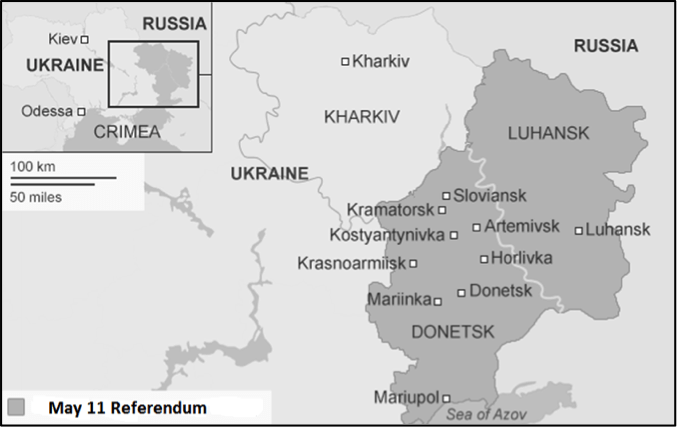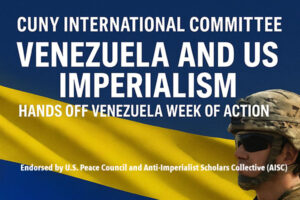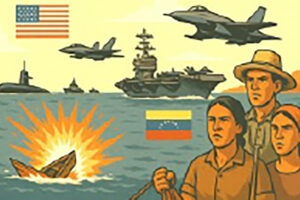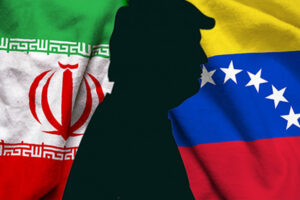Peter Gehl | Saskatchewan Peace News | June 2014 |
“Fascism/nazism is a terrible evil, and if it is not immediately stopped, it will keep growing and sprawling like cancer.” ― T. (teacher from Odessa)
 REGINA – As events unfold in Ukraine, the complexity of the struggle between ordinary Ukrainians for a better for life, Ukrainian oligarchs for continued wealth and privilege, and outside geopolitical forces for world influence and self-interest is becoming more apparent and significant. Unlike recent conflicts with similar forces at play, the conflict in Ukraine directly involves major powers with arsenals of weapons of mass destruction which, if used, would annihilate the human race.
REGINA – As events unfold in Ukraine, the complexity of the struggle between ordinary Ukrainians for a better for life, Ukrainian oligarchs for continued wealth and privilege, and outside geopolitical forces for world influence and self-interest is becoming more apparent and significant. Unlike recent conflicts with similar forces at play, the conflict in Ukraine directly involves major powers with arsenals of weapons of mass destruction which, if used, would annihilate the human race.
Unlike past, more sober and astute Canadian governments, Prime Minster Stephen Harper has modified Canadian political practice toward a more partisan and aggressive, anti-democratic stance both domestically and internationally.
With the aim of extending empire at Russia’s expense and without regard for the Ukrainian people, the United States and European Union along with their followers, which includes Stephen Harper’s Canada, have positioned themselves not only as anti-democratic forces, but willing to risk world war to achieve their goal.
The following article builds on the March issue of Saskatchewan Peace News which provided basic facts on the present situation in Ukraine.
Oligarchs – At Root of Ukraine’s Problems
On April 30, using work by academic Vladimir Matveev, Dr. Andrei Fursov, Director of Russian Studies, University of Moscow, described the Ukrainian oligarchy in a lecture (Youtube) titled, Battleground Ukraine: A Comprehensive Summary, generally as follows:
There are four main clans in Ukraine. Since the collapse of the Soviet Union in 1991, various groups of elites have contested for power in Ukraine. Matveev warned in 2012 that there would be a very brutal conflict in 2013 between them. It happened.
Donetsk clan: This group is headed by Rinat Akhmetov whose fortune is estimated at $16 billion. “His main interests are mining and steel production. This group includes Boris Kolesnikov, the Kluevs, Yury Ivanyuschenko.”
Yanukovych family: The Yanukovych clan has principal control over customs officials, farming and infrastructure. While less wealthy than Akhmetov, this clan has very powerful administrative positions. The greed and stupidity of Yanukovych’s Mafioso clan revealed itself when it imposed fees of 60% not only on medium-sized businesses, but small businesses as well. Basically, a business owner had to pay 60% of his revenue to this family. You can understand those who went to the Maidan Square. They had had enough of the Yanukovych clan.
Firtash: Firtash owns RosUkrEnergo and is based in energy production and chemicals. Firtash is the main partner of the Rothschilds in Ukraine. Robert Shetler-Jones, an entrepreneur from the Rothschild group, is one of Firtash’s main advisers
Privat: Ihor Kolomoisky is the leader of this clan. Kolomoisky is worth 3 billion dollars. His partner is Gennady Bogolubov. Kolomoisky owns about 200 companies including 50% of Privat Bank and 40% of the media company Ukrnafta. Before recent events in Crimea, Kolomoisky was on the verge of buying up assets in Sevastopol. As a big fan of soccer, Kolomoisky owns: FC Dnipro, of Dnepropetrovsk, Arsenal Kyiv, and Hapoel of Tel-Aviv. Information frequently appears in the media about Kolomoisky’s connections with international organized crime.
In 2011, Kolomoisky established the European Jewish Parliament, a non-governmental organization based in Brussels. A year later, he was elected as president of the United Jewish Community of Ukraine.
According to Fursov, Kolomoisky is the engine behind what is currently happening in Ukraine. The current government in Kiev appointed Kolomoisky governor of Dnepropetrovsk.
Pinchuk: This often unmentioned group is smaller, but well connected. Victor Pinchuk who leads this clan is the son-in-law of former Ukrainian president Kuchma. Pinchuk’s people are Tigipko and Yatsenyuk. This group is very closely linked with US and British intelligence.
Poroshenko: With a fortune estimated by Forbes to be $1.6 billion, Petro Poroshenko, the ‘chocolate king’ and head of the Roshen group, is the seventh wealthiest business man in Ukraine. His business empire includes several car and bus plants, Leninska Kuznya shipyard and the 5 Kanal television channel.
Elected president of the Ukraine on May 25, Poroshenko has been in politics since the 1990s. At different times, he has supported all major political figures under both pro-Western and Moscow-backed administrations. In 2005, Poroshenko was forced to resign from the Tymoshenko government. He was accused of corruption for defending Victor Pinchuk’s $80 million take-over of a state firm, Nikopol Ferroalloy, independently valued at $1 billion. Poroshenko was the first Ukrainian billionaire to openly support the anti-government uprising that started in November 2013. In December 2013, Poroshenko joined with Pinchuk and others in supporting the Maidan Square protest.
Aljazeera reported May 23 that “Poroshenko enjoys support from the European Union and the USA, voicing pro-EU integration and pro-NATO sentiments.”
Ukraine – US Target
US Assistant Secretary of State for Europe, Victoria Nuland revealed American interests in Ukraine at the International Business Conference on Ukraine in Washington on December 13, 2013 when she said, “Since the declaration of Ukrainian independence in 1991, the United States supported the Ukrainians in the development of democratic institutions and skills in promoting civil society and a good form of government… We have invested more than 5 billion dollars to help Ukraine to achieve these and other goals.” Nuland also stated that the US will continue to “promote Ukraine to the future it deserves.”
On February 6 in a leaked telephone conversation with US Ambassador to Ukraine Geoffrey R. Pyatt, Nuland specifically named Arsenyi Yatsenyuk to be upcoming Prime Minster of Ukraine. It came to be.
Since the February 21 ouster of Yanukovych, John Brennan, CIA director and US vice-president Joe Biden have visited Kiev. Canadian Prime Minister Stephen Harper and Foreign Affairs Minister John Baird have travelled to Kiev as well.
NATO – Atlanticists in Action
Along with diplomatic efforts, the US, EU and its allies have been busy militarily in the region. Following is a list of recent NATO military activities. The extent of US involvement and the size and sophistication of these exercises are noteworthy.
- ‘Dacian Viper’, Romania, April 10 – 17
- ‘Bodo Main Air Station’, Norway, May 6 – 8
- ‘Jaguar 2014’, Spain, May 6 – 16
- ‘Orzel Alert’, Poland, May 5 – 9
- French ship Dupuy de Lome, Black Sea, May 14
- ‘Spring Storm’, Estonia, May 5 – 23
- ‘Dynamic Monarch 2104’, Poland, May 12 – 23
- US missile cruiser Vella Gulf, Black Sea, May 23
- ‘Carpathian Spring’, Romania, May 9 – 23
- French frigate Surcouf, Black Sea, May 28 – 29
- ‘Thacian Star’, Bulgaria, May 26 – June 4
- ‘Combined Resolve II’, Germany, May 1 – June 1
- ‘Icelandic Air Policing’, Iceland, May 16 – June 5
- ‘Rapid Trident’, Ukraine, July – postponed
Canadian Chief of Defence staff General Tom Lawson confirmed on May 23 in Brussels at a NATO Military Committee meeting that Canada has deployed an additional 20 staff to NATO’s European headquarters in Casteau, Belgium, sent 6 CF-18 fighter aircraft to Romania, and committed HMCS Regina to NATO Standing Maritime Forces. Canada provided 50 soldiers to ‘Orzel Spring’. Canada is also taking part in ‘Combined Resolve II’ and is scheduled to participate in ‘Rapid Trident’.
Energy – Key Component
In modern society, energy has real and critical worth. This is especially true for Russia, the world’s largest producer of oil and second largest producer of natural gas; and for China, the world’s largest emitter of carbon dioxide and largest consumer of coal.
Russia supplies about 30% of Europe’s natural gas, half of which transits through Ukraine [Jon Henly, The Guardian (UK), March 3]. Russia supplies about 55% of the natural gas used by Ukraine. About 25% comes from Turkmenistan with the remaining 20% produced in Ukraine itself [Wikipedia]. Since the collapse of the Soviet Union in 1991, gas consumption in the Ukraine has fallen by over half, mainly in the industrial sector.
The oil and gas network in Ukraine remains mostly state-owned. As part of this network, Naftogaz purchases natural gas and then supplies it to users at a subsidized price. Former Ukrainian prime minister Yulia Tymoshenko, the “gas princess”, became one of the richest persons in Ukraine as a result of her company, United Energy Systems of Ukraine, being the middleman in the purchase of Russian natural gas from 1995 to 1997.
In January 2013, Royal Dutch Shell, owned by the Rothschild group, signed a deal with the Yanukovych government to explore and drill for shale gas in the Donetsk region. Later in the year, Chevron, part of the Rockefeller empire, signed a similar deal worth $10 billion. Fursov writes that the Ivano-Frankivsk region was basically given to Chevron by Yanukovych.
In August 2012, Ukraine announced a deal with ExxonMobil, another Rockefeller company, to produce oil and gas from the Black Sea. Bloomberg reported on March 11 that ExxonMobil has plans to explore the Bulgarian and Russian parts of the Black Sea as well. Aleksandr Tolkach, a spokesman for Ukrainian billionaire Rinat Akhmetov, said the future of offshore drilling is unknowable until the crisis is resolved. Russia took control of the Crimean component of Ukraine’s national gas company before the March events in Crimea thereby obtaining exploratory assets in the Black Sea. In April, the US, EU, Canada and Norway placed trade sanctions on Chemomorneftgaz.
On May 17, Reuters reported that US vice-president’s son, Hunter Biden, has been appointed to the board of directors of Ukraine’s largest private gas producer, Burisma Holdings. Former senior advisor to US secretary of state John Kerry, Devon Archer, joined Burisma earlier in April.
Odessa – Fascists Employed by Kiev
With perhaps 116 persons killed and 200 wounded, the fiery holocaust on May 2 in the Ukrainian city of Odessa at the Trade Unions House and tent camp on Kulikovo Pole Square, where activists were collecting signatures in favour of a federalization referendum and the official status of the Russian language, tells the story of recent, and possibly future, events in Ukraine. Bruce Gagnon, coordinator of the Global Network Against Weapons and Nuclear Power in Space, has viewed the extensive video of the scene. His May 3 commentary is as follows:
“Union hall in Odessa burns after fascist Right Sector forces, working on behalf of the Kiev government put in power by the US-EU, set fire to it. Some 46 died in the flames or from jumping out of the burning building.
Unrest erupted on Friday, May 2, with a mass fight started by football fans from Kharkiv, Right Sector radicals and members of the so-called “Maidan self-defense” force from Kiev, who had decided to march along the streets of Odessa, thus provoking clashes with the supporters of Ukraine’s federalisation.
Obama and the EU leaders blame Russia and Putin for this. The truth is that the Kiev military mobilization against eastern Ukraine began after US CIA director Brennan and V-P Biden made recent trips to Kiev likely instructing them to advance onto protesters in the east.
No doubt in my mind that the US-EU are baiting the bear, trying to get Russia to respond to protect the people in the east which would then give NATO the pretext to make an attack on Russia…
You can see the Right Sector nationalists enjoying themselves as they set fire to the union building in Odessa and take shots at those who refuse to turn Ukraine over to Mr. Big and his fascist agents.
What struck me the most is that the police appear to sit back until the damage is done before they ‘gently’ move in near the end of this video. In the whole video you never hear or see a fire truck…. strange in a big city like Odessa. The US-EU controlled ‘government’ in Kiev must have blocked the fire trucks – all part of the script that was written for this day.”
Where Now Ukraine?
Writing in a Global Research article entitled Ukraine in Turmoil. War May Come at any Time, veteran Swedish journalist Israel Shamir observes that the bloodbath in Odessa along with the May 9 attack on WWII Victory Day celebrations in Mariupol have sent “placid people to the barricades and the voting booths.”
In general, what characterizes the situation in Ukraine is that there isn’t a single political center. There are constant squabbles among the oligarchs to impose their point of view and get richer. Political positions tend to align with their place in the economy and external support.
Destruction of the welfare state began during the time of Kuchma and continued under Yuschenko and Tymoshenko. Yanukovych finished it off. Under Yanukovch, the number of billionaires in Ukraine exploded: 8 billionaires in 2010 and 21 billionaires in 2011.
In 2013, the average monthly wage in Ukraine was US $278 or 2 – 3 times less than in Russia. During Soviet times, Ukraine was the most prosperous republic in the USSR. About 3 million Ukrainians currently work in Russia.
Ordinary Ukrainians are becoming destitute and radicalized. The International Monetary Fund (IMF) “solution” adopted by Kiev will only make matters worse. Journalist and military analyst Scott Taylor on March 2 wrote in the Ottawa Citizen, “…the majority of the public discontent stems from Ukraine’s collapsed economy. Unemployment and underemployment – especially among the youth – is rampant. Were it not for the black market, most Ukrainians could not subsist.”
The election of Petro Poroshenko as Ukrainian president on May 25 will not halt or reverse the fragmentation of Ukraine and the country’s slide into civil war unless the current Kiev government halts its military actions and begins genuine dialogue with the East and South-East of the country. This appears unlikely as long as the US calls the shots. Dr. Fursov appears correct in his assessment that “the Americans need controlled chaos and civil war in Ukraine.” The US needs a country that is absolutely anti-Russian and obedient. A nationalist, Banderite, neo-nazi and NATO country on the border with Russia is ideal to constantly apply pressure on the Russian Federation, plunder the economy of a major trading partner of Russia and create a market for US armaments and consumer goods at the same time.
Because of their corruption, unwillingness or inability, oligarchy is the ideal vehicle for external control. Fursov believes that “if the marionette junta in Kiev can hold out, then by logic they will conduct a policy of terror against the East and South-East.”
Reporting from Kiev on May 27 about the presidential elections, Mathew Fisher in the Regina Leader-Post wrote, “Support for the revolt has been thinner across the east than it has appeared on TV. Having said that, the distrust of Kyiv is profound and nearly universal in the east of the country.”
Canada – Support Ukrainians not Oligarchs and US
You’d think that the 12-year tragedies of Canada’s involvement in the occupation of Afghanistan and the NATO-sponsored regime-change in Libya would have taught the Harper government the folly of participating in US-led military actions. Apparently not.
Canada, US, EU, Japan and a handful of European states are sanctioning Russia and clearly backing the anti-Yanukovych faction of oligarchs in Ukraine. The words of Prime Minster Harper and Foreign Affairs Minister John Baird about Canada’s support for freedom and democracy and the villainous Vladimir Putin, are media spin needed to create a simplistic good-guy, bad-guy equation for public consumption. This approach does nothing to find a meaningful, peaceful solution. Moreover, the interests of ordinary Ukrainians are subverted in the process.
Perhaps, the most alarming aspect of American, European and Canadian activities in Ukraine is the insidious use of fascist, neo-nazi elements in Ukraine to first gain power and then to physically silence or eliminate opponents.
A shift in Canada’s approach is needed:
1. Immediately withdraw Canadian military forces from countries and waters bordering Russia
2. Use diplomatic means to mediate a settlement between Kiev and break-away provinces
3. Drop all sanctions against Russia
4. Withdraw support of IMF austerity measures in Ukraine and provide state-to-state assistance
5. Work towards international recognition of Crimea’s decision to join the Russian Federation
6. Drop participation in ‘Rapid Trident’ exercises
7. Withdraw from NATO
By Peter E. Gehl
Regina Peace Council




